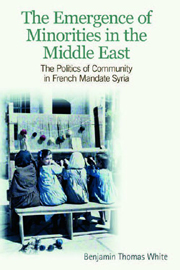Book contents
- Frontmatter
- Contents
- Map 1. Syria c.1936
- Map 2. The Far Northeast of Syria in the 1930s
- Outline Chronology of the French Mandate, 1919–39
- Acknowledgements
- Introduction
- Part I
- 1 Minorities, Majorities and the Nation-state
- 2 ‘Minorities’ and the French Mandate
- Part II
- Part III
- Conclusion: Minorities, Majorities and the Writing of History
- Select Bibliography
- Index
1 - Minorities, Majorities and the Nation-state
from Part I
Published online by Cambridge University Press: 12 September 2012
- Frontmatter
- Contents
- Map 1. Syria c.1936
- Map 2. The Far Northeast of Syria in the 1930s
- Outline Chronology of the French Mandate, 1919–39
- Acknowledgements
- Introduction
- Part I
- 1 Minorities, Majorities and the Nation-state
- 2 ‘Minorities’ and the French Mandate
- Part II
- Part III
- Conclusion: Minorities, Majorities and the Writing of History
- Select Bibliography
- Index
Summary
Introduction
The eleventh edition of the Encyclopaedia Britannica, published in 1910–11, does not contain an entry for ‘minorities’. By the fourteenth edition of 1929 the entry on minorities runs to eleven pages, mostly discussing the post-First World War peace settlements and the League of Nations.
Minorities seem to have come out of nowhere; or rather, the term ‘minority’ does. As late as 1914 it hardly existed in its modern sense of a group ‘distinguished by common ties of descent, physical appearance, language, culture or religion, in virtue of which they feel or are regarded as different from the majority of the population in a society’ – a distinction usually understood to have political significance. But in the immediate post-war period the term suddenly emerged as a key concept in the mainstream of international public discourse, and by the end of the twentieth century it was applied to a bewildering range of groups in widely differing situations around the world. Moreover, once in circulation, the term was freely applied to past societies: Jews in medieval Europe, for example, or non-Muslims in the Islamic empires. The resulting theoretical confusion has been great. The term is frequently – indeed, almost always – used as if it were a neutral, objective category; as if certain groups within any given society are self-evidently ‘minorities’. This is not the case. Still more unsafe is the assumption, implicit in the use of the term ‘minorities’, that ‘majorities’ exist as unproblematic entities.
- Type
- Chapter
- Information
- The Emergence of Minorities in the Middle EastThe Politics of Community in French Mandate Syria, pp. 21 - 42Publisher: Edinburgh University PressPrint publication year: 2011



